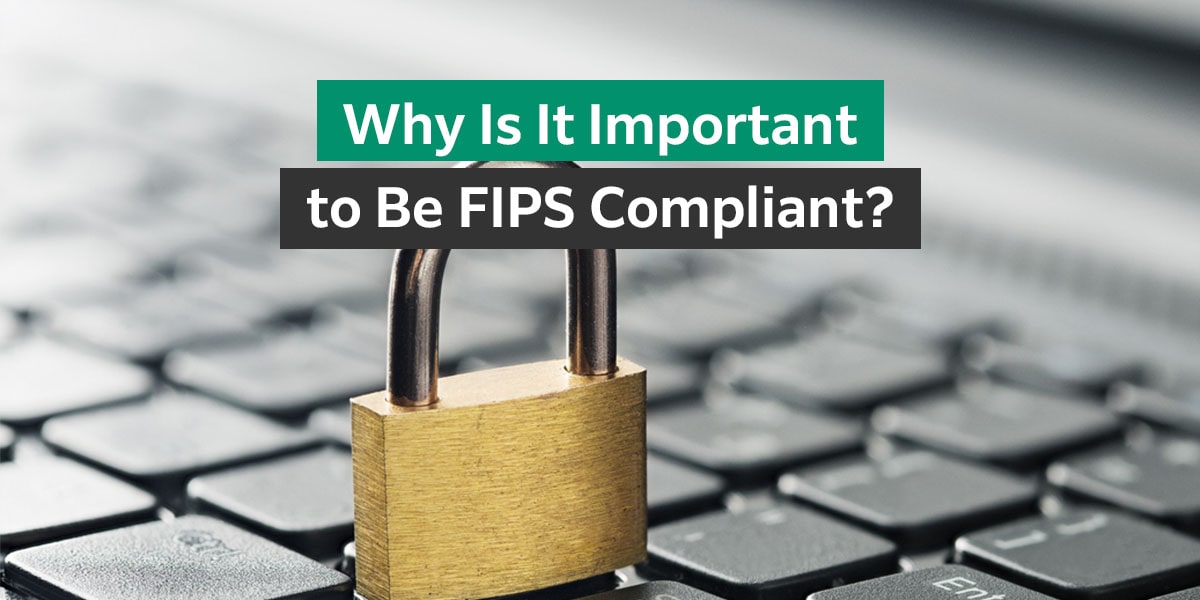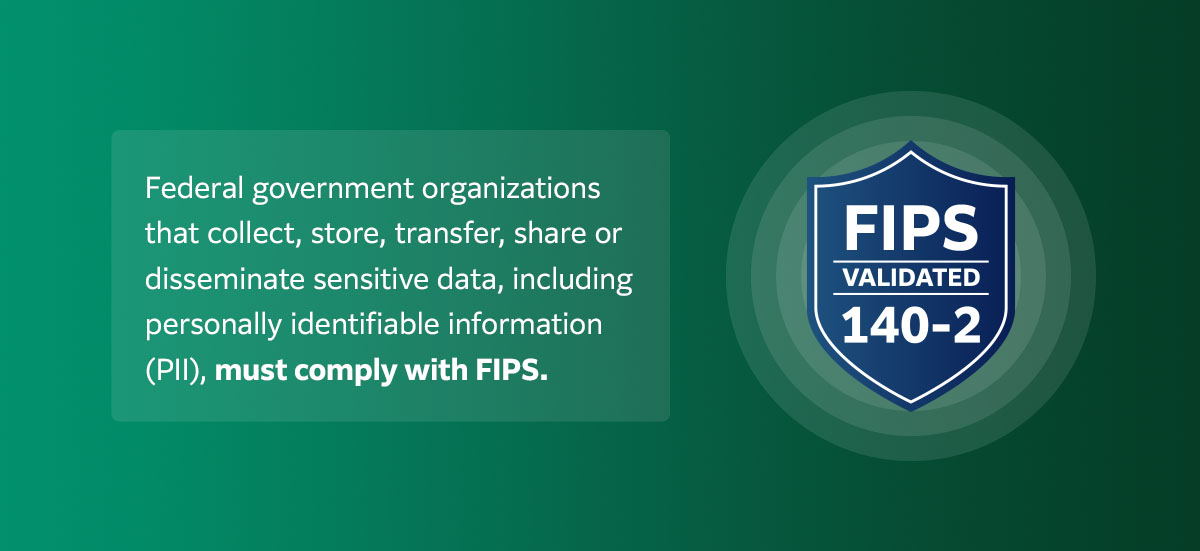What Is FIPS Compliance?

Jump to:
- What is FIPS?
- What is FIPS 140-2?
- Why is it Important to be FIPS Compliant?
- What Are the FIPS Compliance Requirements?
- Who Needs to be FIPS Compliant?
Collecting, storing, using and sharing data is integral to almost every business operation today. Government agencies and private organizations are all implementing measures to protect their systems against cyberattacks and data theft. The United States government and other stakeholders create standards, regulations and best practices to optimize data security and provide clear guidance for implementation. One such set of standards is the Federal Information Processing Standards (FIPS).
FIPS compliance assists the U.S. federal government and private sector organizations in protecting sensitive but unclassified data. FIPS comprises many standards, of which FIPS 140-2 is an example. This article provides a general overview of FIPS and its benefits. It also addresses some industries that require FIPS compliance.
What Is FIPS?
FIPS is an acronym for Federal Information Processing Standards, a set of cybersecurity standards that the U.S. government and organizations engaging with the federal government follow to optimize data protection.
FIPS was created by the Computer Security Division of the National Institute of Standards and Technology (NIST) to establish a data security and computer system regulation in accordance with the Federal Information Security Management Act (FISMA) of 2002. In 2014, the Federal Information Security Modernization Act amended the original FISMA to provide broader protections with thorough security plans and safeguards.
FIPS focuses on data encryption, an integral aspect of almost all cybersecurity compliance frameworks. Data encryption protects authorized access, serving as one of the primary defenses against cyberattacks and data theft.
The U.S. government distributes FIPS standards for public use to enhance data protection and support modern encryption for protected data. NIST oversees the implementation of FIPS compliance standards.
What Is FIPS 140-2?
FIPS 140-2 defines the minimum security standards for cryptographic modules in information technology systems and products. The Cryptographic Module Validation Program (CMVP) maintains testing against FIPS 140-2 standards. The CMCP is a joint effort between NIST and a branch of Canada’s Communications Security Establishment (CSE) called the Canadian Center for Cybersecurity.
FIPS 140-2 standards change over time. The current version contains security requirements that cover 11 areas related to designing and implementing cryptographic modules. Each module has a unique security policy and uses cryptographic key management, approved cryptographic algorithms and authentication techniques. Depending on the requirements met for each area, the cryptographic module will receive a security level rating from one to four. One is the lowest, while four is the highest.
U.S. federal agencies and other organizations engaged with the federal government that uses cryptography-based security systems must comply with the FIPS 140-2 standards to protect sensitive information.
Why Is It Important to Be FIPS Compliant?
Implementing FIPS is essential for several reasons, including the following:
- Ensures compliance: Compliance with FIPS ensures compliance with other applicable laws and regulations. Federal government agencies and organizations that engage with them must comply with these standards to protect data with proper authenticity, integrity and confidentiality levels. Failing to comply with the standards may attract a range of penalties, such as a reduction in federal funding, congressional censure and reputational damage.
- Creates opportunities: FIPS compliance can create commercial opportunities for businesses that develop cryptographic modules. Most government agencies will only offer contracts to companies that are FIPS-compliant. Considering the significance of cybersecurity, private organizations may also prefer to do business with other companies that maintain high levels of security.
- Enhances data protection: FIPS sets high standards, which are necessary to protect data. Federal government agencies store, use and share large amounts of sensitive information across different devices and systems, and it’s only reasonable to put the best possible security measures in place. The same applies to private sector agencies, especially those under contract with the U.S. government.
- Demonstrates high-level security: FIPS validation demonstrates that the technology has passed rigorous testing with an accredited lab. This builds trust and confidence in the system, especially for those looking to find new partners.
What Are the FIPS Compliance Requirements?
FIPS compliance requirements are broad and can change over time — compliance frameworks with specific encryption standards usually refer to a publication. The publications include FIPS 140-2, which covers the following areas:
- Specification.
- Ports and interfaces.
- Finite state module.
- Roles, services and authentication.
- Operational environment.
- Physical security.
- Cryptographic key management.
- Electromagnetic interference and electromagnetic compatibility.
- Design assurance.
- Self-test.
- Mitigation of other attacks.
Almost all government compliance standards include requirements to define the various compliance levels. Generally, each level covers certain aspects of the compliance framework. While some organizations do not require FIPS 140-2 compliance, they may transact with others that adhere to some of the specifications.
Who Needs to Be Compliant With FIPS Security Standards?

Federal government organizations that collect, store, transfer, share or disseminate sensitive data, including personally identifiable information (PII), must comply with FIPS. Government contractors and service providers must also comply with FIPS to optimize data protection. Some state and local government agencies, especially those that administer federal programs like Medicaid, Medicare, student loans and unemployment insurance, require compliance with FIPS.
Although optional, many private organizations not engaged with the federal government still comply with FIPS due to its benefits.
FIPS compliance is crucial for most industries. Here are four examples:
1. Banking and Finance
Banks and other financial institutions use large amounts of nonpublic personal information (NPI) and PIIs, necessitating the need to ensure data protection. The Gramm-Leach-Biley Act (GLBA) requires such companies to explain their information-sharing practices to their customers and safeguard sensitive information. Non-complying organizations can face severe penalties. Besides avoiding sanctions, FIPS allows financial institutions to protect customer records against vulnerabilities.
2. Merchants and Service Providers
Merchants and service providers that handle payment card data must comply with Payment Card Industry Data Security Standard (PCI DSS). By extension, these institutions may also comply with FIPS since PCI DSS requires companies that process, store and transmit payment card data to encrypt the data in transit and at rest.
3. Health Care
Organizations in the health care industry use sensitive data collected from patients. Platforms that collect, store and transmit protected health information (PHI) must comply with the Health Insurance Portability and Accountability Act (HIPAA). FIPS 140-2 compliance enables such institutions to adhere to the regulations and protect sensitive health-related data.
4. Manufacturing and Product Testing
Manufacturers and testers of electronic devices use encryption to protect the data they receive and process. FIPS compliance allows these organizations to maintain high-level cybersecurity compliance. NIST requires products that comply with the ISO-IEC standards to use FIPS-compliant encryption.
Learn More From FUJIFILM North America Corporation
FIPS compliance enhances data protection and security for government and private agencies. It establishes high cybersecurity standards to reduce vulnerabilities and breaches. Businesses, especially those that engage with manufacturers and testers, should protect the information they share. It’s best to transact with FIPS-compliant organizations.
Fujifilm leverages years of experience to provide superior non-destructive testing (NDT) across various industries. In addition to manufacturing an impressive line of equipment designed for multiple testing procedures, Fujifilm offers formal training to equip your workforce with the needed skills and knowledge.
Our testing solutions reduce unnecessary material waste, decrease downtime for inspection, expedite the manufacturing process and improve quality and performance. Contact us now to learn more!











